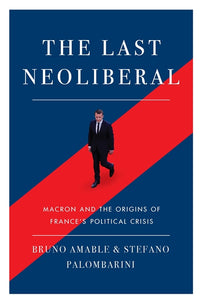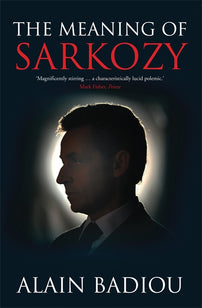The End of the Republican Front
Much has been made since Emmanuel Macron's victory over far right candidate Marine Le Pen on April 24th of the scale of his victory. But as Marlon Ettinger writes, with the two previously dominant parties on their last legs, the latest French election represents merely another breakdown in the country's conventional political scene, one that could provide openings for both the left and the right.

On a Sunday evening in the Champ-de-Mars – a park in the West of Paris, under the watchful eye of the Eiffel Tower – supporters of Emmanuel Macron gathered for the announcement of the election results. Here was a mix of students, bankers and clerical workers.
As the clock ticked down to the announcement of the second round exit poll, I began to fantasise about the possibility of Macon’s defeat. This liminal, interstitial moment was laden with flights of irrational fantasy, the vestiges of weeks spent following Jean-Luc Mélenchon, the left wing tribune who came within a rabbit’s toenail of making it into the second round on April 10th. So many people had rejected the idea of ever voting for Macron again – could that extend to electing Marine Le Pen to the presidential palace? What if the Champ-de-Mars deflated when the results arrived, announced on the enormous screens that flanked the podium on which the current president would later speak? What if it was Marine Le Pen, at her gathering in the Bois de Boulogne even further to the West, marching out with la Marseillasie blaring to give a victory speech that nobody had anticipated? I had to stop myself and remember it wasn’t the fiery, loquacious Mélenchon facing off against Macron. The debate last Wednesday proved that. A stilted Le Pen had barely mentioned any of the numerous improprieties of Emmanuel Macron’s term. Instead, she chose to burnish her credentials as a leader like any other; a stateswoman, a steady pair of hands. Against the consummate professional striver Macron, with his lapidary, coached performance, there was no competition.
Were Macron’s supporters confident in those final minutes? As I spoke to the assembled crowd that day, Ambroise Méjean came by. He is the president of Youth With Macron (JAM). Just 26, he has a diploma in commerce, and began working for Macron's movement in 2016. JAM now has 31,500 members. Méjean wore a crisp white shirt without a tie under a dark blue suit.
"It's the end of the Republican Front," he said when asked about the score of the far right, projected to be higher than it had ever been in the history of the Vth Republic. But he was confident Macron would emerge victorious. The vote represented a confrontation between the nationalist and the progressive camps in the country, Méjean said.
Despite a vertiginous rise in the reactionary camp’s vote, said Anthoine Gossent, a 20-year old law student who worked for Macron's campaign in Provence-Alpes-Côte d'Azur (or, PACA) in France’s Southeast, Macron’s team can be proud of their record. It was a sign of confidence that the president’s vote had progressed. In the first round this was true – he won almost 100,000 more votes than he had in 2017 in PACA. And Marine Le Pen’s score had declined by about 40,000 votes. But Éric Zemmour, the reactionary candidate who presented himself as an even tougher version of Le Pen, got more than 300,000 votes on his own. The reactionary camp had expanded by leaps and bounds in the region, and with the collapse of the Socialist Party and some of Les Républicains into Macron’s camp, this progression was less impressive. After the first round, the newspaper La Marseillaise pointed out that between Zemmour and Le Pen, the far right vote had soared in Vars and Bouches-du-Rhone, the regions around Marseille. In all of Provence, the reactionary camp improved its score by 24%. In 2017’s second round, Macron won 1,306,636 votes; this time, it was just 1,214,178. And in 2017 Macron had walloped Le Pen in PACA, 55% to 44%. This time, she managed to edge him out with 50.48% to his 49.52%.
In the end, the margin of victory was wide, something that the liberal commentary made much of in the days since. A 17.2% walloping is something anybody should be proud of. What if a Democratic president had won against the Republicans by a similar score, or the British Labour Party? Despite the increasingly fascistic character of the American Republican party though, the formations in these countries are different, and traditionally signify different things. Europe today is no stranger to governments that include parties with fascist origins – in Austria, the mainstream conservative party has entered into coalition multiple times with the Freedom Party, whose first leader was a former SS member. The National Rally has similar origins, though draws from a more heteroclite base. Founded as the National Front by Marine Le Pen’s father Jean-Marie Le Pen, along with other luminaries of the right like the former Gaullist and resistance leader Georges Bidault (Bidault left after a few days, finding the party too fascist) in 1972, its aim was to unite the Nationalist movement in France. Le Pen took leadership in no small part because he represented a more moderate section of French nationalism.
[book-strip index="1" style="display"]His daughter Marine, despite several high profile clashes with her father (in 2015, he was suspended from the party after he claimed that the Nazi gas chambers were a “detail” in the history of the Second World War – although he was later reinstated), has pursued the same strategy, seeking to launder the most reactionary elements of her movement via her more moderate medium. As for the father and daughter’s personal disagreements, time heals all wounds. The honorary president of the National Front, now 93 years old, watched the election results at his home in Rueil-Malmaison in the suburbs to the West of Paris. When the results came in, Jean-Marie was disappointed. As Le Parisien reported the day after the election, he told his guests after the results came in: “I congratulate Marine Le Pen”. “She knows what I think and my heart beats for her and for all the militants.”
“She did everything she could,” the elder Le Pen said, looking forward to the future, after talking excitedly about the legislative elections and the potential for an alliance between his daughter and Éric Zemmour. “She did very well.”
And despite Macron’s overwhelming win, he still lost some 2 million votes from the total in 2017. In the centre of France, in the Southwest, and in Corsica, his score dropped by 20%. Even in Paris, where he won 85.1% of the vote, he was down somewhere between 3 and 5%, all as Le Pen continued her steady progression. In 2017 she won just two departments – this time she won 28. And despite failing to make any progression in the big cities, she won three regions outright. The rumours of Le Pen’s death are greatly exaggerated. She remains on the march.
–
Macron has, by any standards, an enormous mandate. Lionel Jospin, France’s Socialist Party Prime Minister from 1997 to 2002, told Le Parisien last Tuesday that Macron has once again “done everything to repeat an ultimate faceoff with the far right.” The president, he said, had “played with fire.” Macron had assembled a “motley conglomerate behind him without a clear identity.” This strategy of confrontation with the far right, Jospin said, came about because Macron thought Le Pen would be an easier opponent for him to defeat.
In 2002, Jospin was excluded from the presidential runoff by a last minute surge for Jean-Maire Le Pen. It was the much-vaunted “Republican Front” against the far right that buried Le Pen Senior on that occasion, with almost the entire French political spectrum calling for a vote for the conservative Jacques Chirac to defeat him. Chirac notched 25.5 million votes; Le Pen senior 5.5 million. Twenty years later, his daughter got 13.2 million.
That first round defeat for Jospin was produced in no small part by an unprecedented fracture on the French Left. Now, the Socialist Party he represented is on its deathbed. Its candidate, Anne Hidalgo, won just 1.75% of the vote. In Paris, where Hidalgo is still mayor, she won 2.17%. And while in 2012, her party won the presidency, now, at the Champ-de-Mars, Manuel Valls, the last Socialist Prime Minister and an early supporter of Macron’s in 2017, hovered around the president’s ministers. It is no secret that Valls was desperate for a position in the Macron’s cabinet, the younger man a former member of the Socialist’s cabinet, even if he’d been denied that position over the past five years. An article in Libération a couple of days later, though, raised an embarrassing question: had Valls been invited? Nobody was sure. What was clearer was that the Socialist Party was living through its last days, another victim of the allure of Macron’s reinvention of France’s traditional parties. This is only one of his many powers.
—
It was in Marseille that I first caught a glimpse of Macron's true political force. He is not really a tribune or an orator - but he presumes that he is and by the force of his personality and the mythology he constructs around himself, he can coax loyalty, cries of acclaim, even passion from his crowd.
His supporters simmered exquisitely under the Marseille sun, soaking up the Jardin du Pharo ultraviolet on that glorious mid-April day, wilting and drooping as Macron made a pitch designed for the Mélenchon voters who had won the city for the old tribune. He was not the same as Marine Le Pen, he insisted. He would not allow anybody to say he was! The media obscured his true record, everything he had accomplished – everything they had accomplished together. He would defend it, sleeves rolled up on his crisp white shirt. When I asked those in the crowd what they thought of Macron’s plans to increase the pension age to 65, no one seemed much bothered by it. That was the way things were. Most people couldn’t retire on a full pension before then anyway, one said.
Only around 2500 people showed up to see Macron speak that day, although a pack of Gilets Jaunes protesters turned up outside. They were a small and motley crew, and they were supervised by a veritable phalanx of riot cops in turtleshell body armour, there to prevent them blocking the street or talking to Macron’s supporters as they filed out of the meeting. Éric, one of the protesters, told me that he’d been out in a yellow vest for the past three years. “He massacred [us] here,” he said. “Macron is a thief. I’m against him.”
Celine called him a thief too, and a fascist. “Between two fascists, we’ll choose the least worst,” she told me. She’d be voting for Le Pen.
During Macron’s speech, protestors were escorted out of the garden when they broke into song:
“We’re still here. We’re still here. Even if Macron doesn’t like it, we’re still here.”
–
Emmanuel Macron is an institution now. By winning reelection, he becomes France’s first 21st Century leader, one who will define the country in this century. France’s reputation as an exceptional social Republic, established by the post-war social democratic bargain, may continue, but the reality won’t. Since the presidency of François Mitterrand the model has already been attenuated, and Macron’s role will be to complete France’s transition to a European country like any other. Already a rumour floats around that a Senator in Macron’s party La Republique En Marche will try to amend the constitution to let him run again. Macron's greatest talent is the sleight of hand he possesses which lets him present the old as new, played out ideas as innovation. In this respect, he takes after the founder of the Vth French Republic, Charles de Gaulle, a man who could recast imperial nostalgia and martial duty, virtues of the semi-aristocratic 19th century milieu from which he came, as an alternative project in the post-war world.
–
The Republican Front, then, didn’t break. But it did buckle. Macron overperformed in the polls – many voters only made their decision at the last minute, reported Le Parisien on the 26th. The newspaper spoke with voters who had made their choice in the polling booth. It was a dirty duty – something to be done only to keep the far right out of the presidential palace, nothing to be proud of. Bénédictine, 24, who’d voted for Jean-Luc Mélenchon in the first round, decided at the last minute to vote Macron, but it cost her something. “I had a hard time accepting that I did that,” she told the newspaper.
[book-strip index="2" style="buy"]As Le Monde Diplomatique said before the first round, Macron represents the aspirations of a significant bloc of France’s bourgeois and conservative voters. This was true in 2017 too, but he now represents much greater danger to the popular classes with his reelection. His first term had the Gilets Jaunes and the covid pandemic as an airbrake on his most brutal and ambitious agendas. Now, there “are no other obstacles.”
First on the agenda is pushing through a reform to France’s pension system. The retirement age will be raised from 62 to 65 to start. Everybody presumed this would be done and dusted in Macron’s first term. In fact, right before the first lockdown began in March 2020, it was the next item on the National Assembly’s agenda. It was pushed to the side, though, part of a pseudo-chivalrous concession from Macron in the face of a “war” against the virus. The pandemic required a l’union sacree – governance without politics, a truce against political struggle in the time of war. Politics would return once the enemy was vanquished, whenever that many-headed hydra had finally been laid low. Now, with the enemy defeated, politics has come roaring back. Ahead of the second round, with Mélenchon’s left wing voters in Macron’s sights, he was gracious – maybe the retirement age could be raised just two years, to 64, he teased. And democracy could be central to the augmentation – Macron flirted with the proposition of a referendum.
Already though, this offer seems to have been withdrawn. Macron’s Economy Minister Bruno Le Maire recently proposed the invocation of article 49.3 of the French constitution to push through Macron’s pension reform. It all depends on the results of the legislative elections in the middle of June. Macron has mastered the art of acting like he’s respecting democracy as long as he’s had an overwhelming majority in the National Assembly – democracy then means listening to people’s concerns, not actually implementing them. If he wins a majority and a pliable Prime Minister, there’ll be no need for any undemocratic measures. Macron only negotiates after victory.
–
When he finally walked out to address the crowd in the Champ de Mars, it was to The Ode to Joy, the anthem of the European Union. The theme contrasted jarringly with the scene earlier that day, when a blank-faced DJ in a leather jacket bobbed cooly, spinning club remixes and gentle drum and bass.
The Ode to Joy begins with the thrum of cellos, which are then joined by voices, before culminating in the power of the full orchestra. Throughout this gentle introduction, Macron walked through rows of his supporters, shaking hands in regal fashion. There was no rush. He greeted people deliberately, exchanged words, grabbed forearms and shoulders as he made his way to the podium. European Union and French flags flew in equal measure from the crowd behind the barrier.
One law student I talked with, Marie, 22, told me that as she’d waited in line to come in with the crowd, many of the people she saw confirmed all the stereotypes of Macron supporters, she said. I asked her what she meant, and she said the clothes they wore, the hats, the jackets – all very chic. She lived in the neighbourhood and had been out running; she’d just popped in to see what was going on. In 2017, she’d been more for François Fillon. He’d been the candidate for the mainstream right wing party Les Républicains, which the former president Nicolas Sarkozy had formed. Fillon had been Sarkozy’s prime minister from 20017-2012, and was brought down in the 2017 election by a scandal involving the fictitious employment of his wife as a parliamentary assistant, as well as accepting expensive suits as gifts from a political donor.
This time around, the Les Républicains candidate Valérie Pécresse scored just 4.4% of the vote, below the 5% threshold to receive government financing. The reason, an Éric Zemmour supporter named Antoine de Loisy told me at a Zemmour rally in March in Paris, was that the Les Républicains electorate had split after 2017. This split, de Loisy explained to me, was between the more socially liberal wing of the party represented by Alain Juppé, Chirac’s Prime Minister and the longtime mayor of Bordeaux, and Fillion. Fillon’s supporters had gone for Zemmour or Le Pen, de Loissy claimed. The Juppé wing had joined Macron.
After Pécresse’s abysmal result, which left the party and herself millions of dollars in debt, Sarkozy threw his support behind Macron. It was an endorsement that had been noticeably absent throughout the first round campaign. A cartoon in the satirical fortnightly Le Canard enchaîné showed a caricature of Sarkozy handing a fuming Pécresse a check to pay back the debt she and the party are in. “You have my total support,” the caricature of Sarkozy says.
Now, the two established parties of France are on their last legs. Combined, their candidates got fewer votes than Éric Zemmour, a first time candidate running on a platform of mass deportations and a struggle against the Great Replacement of the native French population. With Sarkozy’s endorsement of Macron, he has folded the last two presidents of the Vth Republic into his camp. The alternatives to his rule are the rising fascist ambitions of Marine Le Pen and the even more hard line and ordoliberal Éric Zemmour. Arrayed against this bloc is Jean Luc Melenchon’s l’Union Populaire, representing a “revolutionary left [that’s] more and more popular,” in the words of the Catholic monthly Le Pèlerin.
–
Marie told me that the French people need a strong leader, something the institutions of the Vth French Republic are uniquely suited to fostering. Gossent, the young law student, told me that people his age were searching for security, and they were concerned above everything else with improving their purchasing power.
I asked him what his first memory of Macron was. He paused and reflected. He liked the question.
"Young," he ventured. Then "accessible." He thought again for a moment, then had it. "Profoundly human."
Marlon Ettinger is the author ofZemmour & Gaullism
[book-strip index="3" style="display"]



